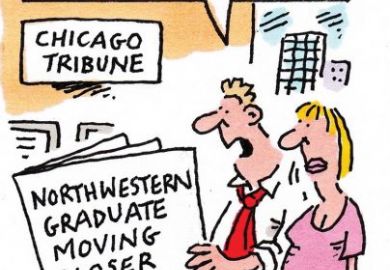
Librarians at the University of Liverpool were more than a little bemused when they discovered that a student had returned a book with a wrapped piece of processed cheese inside. The Tab reported that on its Twitter account, the library tweeted “this is not a bookmark” with a picture of the offending slab, before adding later: “Me talking to the pest control man – ‘No mate I’ve no idea why we have mice in the library’ *Picks up a book and actual cheese falls out of it*.” Of course, the tweets prompted a flurry of cheesy gags, including Liverpool’s School of Arts replying that “Camembert it when people do this. Unbrielievable.” It’s unclear why the cheese – if a pre-packaged slice deserves such a title – was left in the book, but librarians will be hoping the student handles their texts more Caerphilly in future.
Billionaire George Soros has pledged to donate $1 billion (£763 million) to a university network that will “promote the values of an open society”. Speaking at the meeting of the World Economic Forum in Davos, the hedge fund tycoon railed against the ascendance of authoritarian rulers around the world and said that the new university network would encourage freedom of expression and diversity of beliefs. The Open Society University Network has been set up by Bard College in New York and the Central European University, founded by Mr Soros, which has been forced to relocate to Vienna from Budapest after it was driven out of Hungary by the right-wing government led by Viktor Orbán.
About 180 international students have been unable to start their courses at a private university that “paused” its recruitment because of financial problems. Richmond, the American International University in London said earlier this month that it had suspended recruitment for students scheduled to start in January. One international student told Times Higher Education that the university sent an email warning them not to travel to the UK just hours before their flight departed, but they did not read the message until after arriving in London. Despite having received a refund on their fees, the student – who has now returned home – estimated that they were still about £3,000 out of pocket, taking into account the cost of visa fees, flights and travel and accommodation in the UK. They said they had also sought medical help for stress. Phil Deans, acting president of Richmond, said the number who arrived in the UK after the pause was announced was in “single figures” and “they were able to access personal, one-to-one on-campus advice and support, as well as telephone support”.
A publisher has apologised after a French undergraduate history textbook included a reference to a conspiracy theory that the 9/11 attacks on the US were “orchestrated by the CIA”. The debunked theory was spotted in the book History of the 20th Century in Flash Cards, a textbook aimed at students taking courses in France. The publisher, Ellipses, said in a statement on its website that the phrase should never have appeared, BBC News reported. “This phrase which echoes conspiracy theories devoid of any factual basis should never have been used in this work. It doesn’t reflect the editorial position either of Ellipses publications or the author,” it said.
Students at a Scottish university are receiving hundreds of pounds each year from a bizarre bursary for those with the surnames Gillies and Carmichael, The Times reported. The Gillies-Carmichael Bursary, said to date back centuries, is awarded every year to students at the University of Edinburgh in their second or later years who have the surnames, regardless of subject. Students who have recently received the award described their surprise at unexpectedly receiving emails saying that they were entitled to the funds. One, Cameron Gillies, said he thought “it was a joke until the bursary landed in my account”, the newspaper reported. “I do think the money could be used to help those who deserve it more,” he added. Ross Greer, education spokesman for the Scottish Green Party, warned that the university could be inundated with people changing their names to qualify for the money.
Register to continue
Why register?
- Registration is free and only takes a moment
- Once registered, you can read 3 articles a month
- Sign up for our newsletter
Subscribe
Or subscribe for unlimited access to:
- Unlimited access to news, views, insights & reviews
- Digital editions
- Digital access to THE’s university and college rankings analysis
Already registered or a current subscriber?





